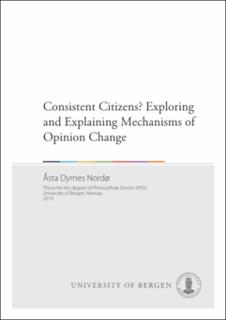Consistent Citizens? Exploring and Explaining Mechanisms of Opinion Change
Doctoral thesis
Permanent lenke
https://hdl.handle.net/1956/21255Utgivelsesdato
2019-12-20Metadata
Vis full innførselSamlinger
Sammendrag
This dissertation examines patterns of public opinion change and their determinants from the perspectives of both internal and external theories of opinion change. Based on new and original panel data on Norwegian citizens’ opinions on a range of policy issues from 2009 to 2017, this study contributes four main insights, summarized in the concept of ‘the consistent citizen’. First, the dissertation reveals a comparatively low level of opinion change both when opinion change is studied both in the short run and the long run, and across an exhaustive range of political issues. Thus, I argue that people change their political opinions to a moderate extent, thereby challenging long-standing scholarly beliefs about the widespread volatility of mass public opinion. Second, the dissertation demonstrates that opinion change is somewhat influenced by (a) party cues, although the effects differ depending on the party’s role in the policy process and the saliency of the issue; (b) political awareness; and (c) issue importance. That said, all these conventional expectations prove more modest than what much of the previous literature has argued. Moreover, in terms of effect size, the biggest effect on opinion change is assigned to (d) external shocks, while (e) the political salience of the policy issue at hand is found to have more moderate effects on opinion volatility. Therefore, I argue that when opinion change takes place, it happens in predictable ways given the context of the policy issue at hand and individual preconditions. Third, another main finding is that sudden extensive changes in public opinion due to external events do not necessarily cause a permanent shift in preferences. I identify an attitudinal baseline that citizens move away from in response to a sudden exogenous shock and yet revert to after a considerable amount of time has passed. Consequently, I argue that the existence of a baseline attitude serves to support the argument that citizens’ attitudes are grounded in broader beliefs (such as ideologies or values). Fourth, following citizens’ policy opinions across one gradual process of policy formation and one where there is an exogenous shock to the political system, this dissertation suggests that understanding the context is important to predicting opinion change. Studying opinion developments in real-time settings, I argue that the rhetorical environment that surrounds an issue, as well as the political and societal contexts that it operates within, is likely to contribute to both the scope and timing of opinion change. Overall, these findings suggest that on average, citizens are consistent and able to manage their role as democratic citizens by holding mainly stable baseline opinions as long as nothing happens, yet they are responsive to actual changes in the political environment. This sketch of a consistent median citizen challenges much of the existing literature and have important implications for how we evaluate citizens’ democratic competence within normative democratic theory. By studying an exhaustive range of policy issues within one polity across an extended period of time using different data sources with differing modes of conduct and time between waves, this dissertation offers one of the most comprehensive studies of opinion instability within a European multi-party polity. As the European literature on opinion instability is scattered and inconclusive, adding one more study to the European body of research is a contribution in itself. Moreover, by utilizing observational panel data, I can make more sound causal conclusions about the patterns of attitude change as they take place in the real world and take context more systematically into account. In sum, the empirical and methodological approaches undertaken in this thesis provide both substantive knowledge and improved causal evidence about the scope of opinion change and its mechanisms within a multi-party system.
Består av
Paper I: Nordø, Åsta Dyrnes. “Opinion Instability in Representative Democracies: Making a case for the Politically Consistent Citizen.” The article is not available in BORA.Paper II: Nordø, Åsta Dyrnes. “Do Voters Follow? The Effect of Party Cues on Opinion Change during a Policy Process.” The article is not available in BORA.
Paper III: Nordø, Åsta Dyrnes and Elisabeth Ivarsflaten. «The Scope Effects of the Refugee Crisis on Public Opinion towards Immigration.” The article is not available in BORA.
